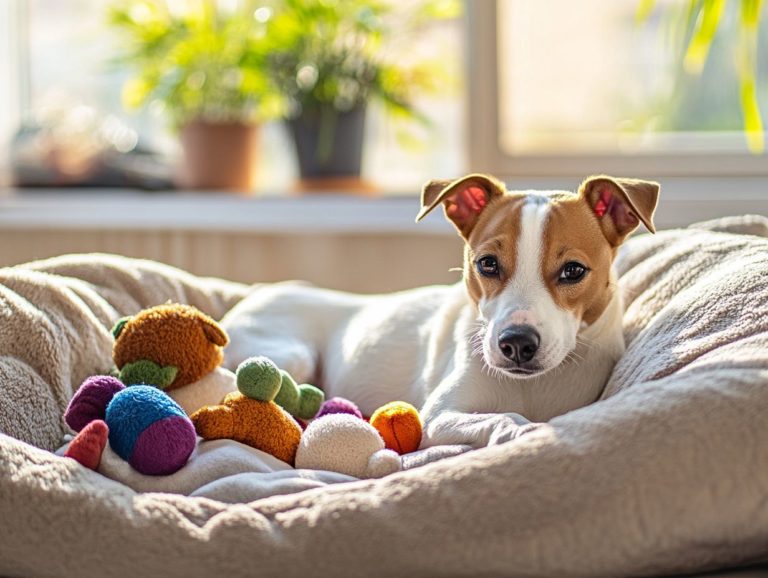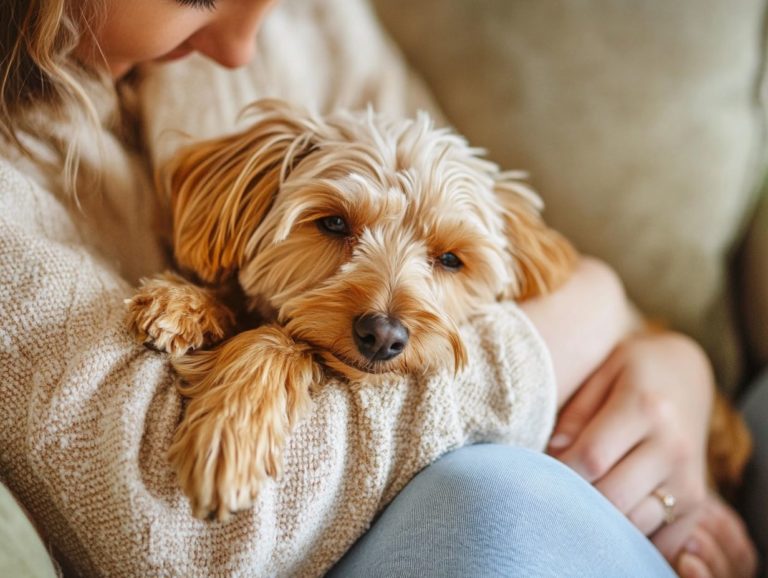What Are Effective Strategies for Pet Anxiety?
Pet anxiety is a prevalent challenge that many beloved companions face, often resulting in distress and behavioral hurdles.
Grasping the causes and triggers of anxiety is essential for helping your pet feel more secure and at ease in their surroundings.
This article delves into the signs and symptoms you should be vigilant for, alongside effective management techniques and an array of treatment options.
From medications and natural remedies to crafting a calming environment, get ready to discover tips that will transform your pet s life!
Uncover the ways to provide your pet with the comfort they truly deserve and enhance their overall quality of life.
Contents
- Key Takeaways:
- Understanding Pet Anxiety
- Signs and Symptoms of Pet Anxiety
- Managing Pet Anxiety with Behavioral Techniques
- Medications and Supplements for Pet Anxiety
- Alternative Therapies for Pet Anxiety
- Creating a Calming Environment for Your Pet
- Frequently Asked Questions
- What Are Effective Strategies for Pet Anxiety?
- Can Behavioral Training Help with Pet Anxiety?
- Are There Any Natural Remedies for Pet Anxiety?
- Is Medication a Recommended Strategy for Pet Anxiety?
- How Can Exercise Help with Pet Anxiety?
- What Can I Do to Create a Safe and Comfortable Environment for My Pet?
Key Takeaways:
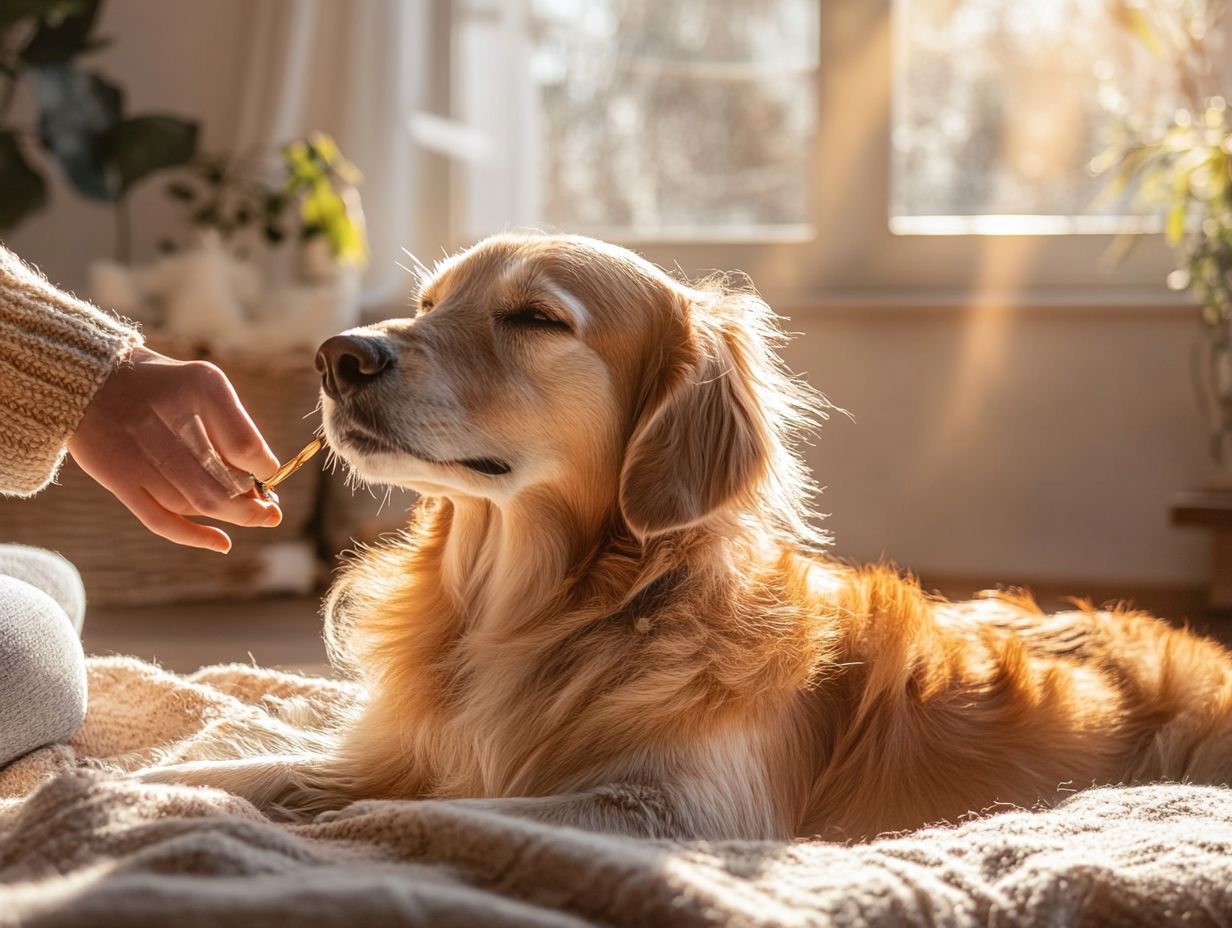
- Recognize the causes and triggers of pet anxiety to effectively manage it.
- Behavioral techniques such as training and desensitization (gradually exposing your pet to anxiety triggers) can help alleviate pet anxiety.
- Creating a calming environment and incorporating natural remedies can reduce stress and anxiety in pets.
Understanding Pet Anxiety
Understanding pet anxiety is crucial for any dog owner dedicated to creating a happy and healthy home for their beloved companions. Anxiety in dogs can reveal itself in numerous ways, such as separation anxiety, fear of loud noises, or general unease.
By recognizing these emotional signals, you position yourself to take proactive steps whether that means reaching out to a dog trainer or consulting a veterinarian to ensure your anxious dog receives the essential care and attention they deserve.
By tackling underlying behavioral issues, you can craft a safe, calm environment for your pet, significantly enhancing their quality of life.
Causes and Triggers
Various causes and triggers can lead to your dog’s anxiety, including separation anxiety, fear of thunderstorms, and changes in their environment.
Loud noises like fireworks can easily upset your dog, and situations such as a simple trip to a new park can unexpectedly throw your canine companion off balance. These common scenarios often catch dogs by surprise, leading to anxious behaviors like excessive barking, hiding, or restlessness.
To help your pup navigate such stressors, establishing a predictable routine can be incredibly beneficial. Consistent meals, regular walks, and dedicated playtime create a sense of stability, allowing your dog to feel more secure in their surroundings.
Gentle physical contact, such as petting or cuddling, can offer comfort during stressful moments, reassuring them that they re safe and loved, even in unfamiliar situations.
By recognizing and gradually exposing them to these triggers, you can foster resilience and boost their confidence.
Signs and Symptoms of Pet Anxiety
Recognizing the signs and symptoms of pet anxiety is essential for you as a dog owner, as early detection can prevent more severe behavioral issues down the line.
An anxious dog might showcase symptoms like excessive barking, destructive behaviors, or even withdrawal from interaction. It’s crucial to understand your dog’s body language; watch for signs such as flattened ears, a tucked tail, or pacing, which can all indicate stress or fear.
By identifying these emotional cues, you can take proactive steps to seek help and implement effective strategies to alleviate anxiety, addressing any common questions that may arise along the way.
Recognizing Behavioral Changes
Recognizing behavioral changes in your dog is essential for understanding when they might be experiencing anxiety or stress.
These changes can appear in various forms perhaps increased aggression toward other pets or humans, an unusual clinginess where they seem to seek your presence incessantly, or noticeable withdrawal and hiding in unfamiliar environments.
When you notice such behaviors, it s important to consider how they might link to anxiety symptoms, as they could indicate that your dog is feeling overwhelmed.
Paying close attention to your dog s body language, including the position of their ears, tail, and overall posture, can provide valuable insights into their emotional state. By consistently monitoring these signs, you can better support your furry friend in navigating life s challenges.
Managing Pet Anxiety with Behavioral Techniques
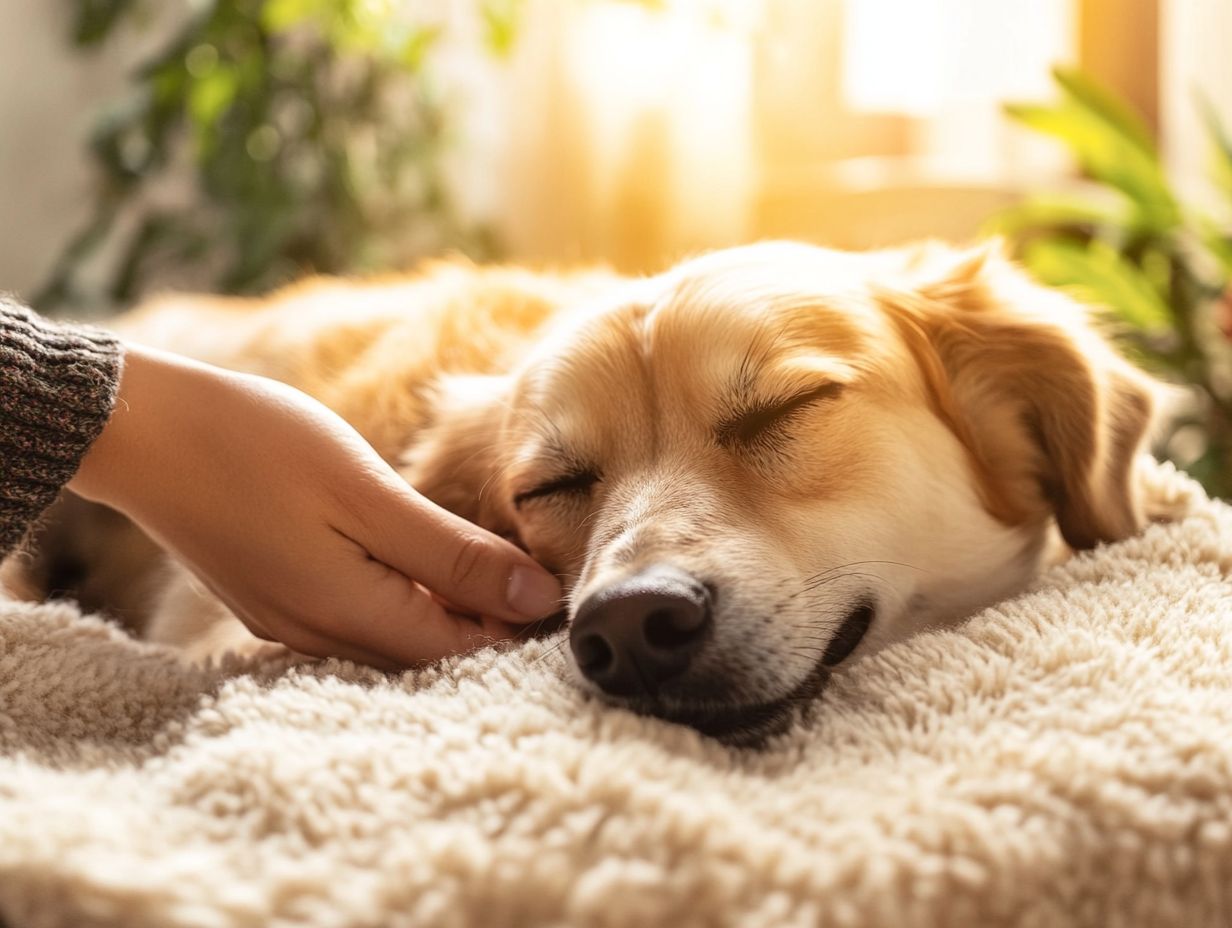
To manage pet anxiety, use behavioral techniques to soothe your dog, as outlined in understanding pet anxiety. This enhances their overall well-being.
Calming games and mental stimulation can redirect your puppy’s focus. This contributes to managing their anxiety over time. Ultimately, these approaches foster a more serene environment for both you and your beloved canine companion.
Training and Desensitization
Training and desensitization are essential for helping your dog feel secure in their surroundings.
These processes involve helping your dog get used to situations that may trigger fear or anxiety, allowing them to adjust gradually. One effective technique is controlled, incremental exposure to specific triggers, such as loud noises or crowded spaces, paired with positive reinforcement.
You may wonder how long this process will take. Remember, every dog is unique, and timelines for noticeable changes vary significantly.
Working with a qualified dog trainer brings expertise and ensures the methods used are safe and tailored to your dog’s individual needs, fostering a nurturing learning environment.
Medications and Supplements for Pet Anxiety
Medications and supplements can be essential tools in managing your pet’s anxiety, especially when behavioral techniques fall short. For pet owners looking for guidance, understanding best practices for traveling with anxious pets can also be beneficial. Commonly prescribed medications like SSRIs, clomipramine, and benzodiazepines can effectively alleviate anxiety symptoms.
Veterinarians often recommend natural supplements like CBD oil, Thundershirt, and Rescue Remedy, which may offer relief without the side effects of traditional medications.
By understanding these options, you can make informed decisions that prioritize your dog’s mental well-being.
Types and Effectiveness
The types of medications for dog anxiety are diverse, and understanding their effectiveness is crucial for relief.
Navigating these options can feel overwhelming, particularly when weighing natural supplements against prescription medications. You might prefer safer, holistic alternatives that promise calming effects without the potential side effects of conventional drugs.
Conversely, prescription medications like SSRIs, clomipramine, and benzodiazepines could provide immediate solutions for severe anxiety. Each approach has its advantages and considerations.
This emphasizes the importance of consulting with a veterinarian to create a tailored treatment plan that meets your dog’s specific needs and temperament.
Alternative Therapies for Pet Anxiety
Alternative therapies offer valuable support for managing pet anxiety, providing dog owners with options beyond traditional medications. If you’re wondering what to do if your pet is anxious after moving, these alternatives can be especially helpful.
Natural Remedies and Techniques
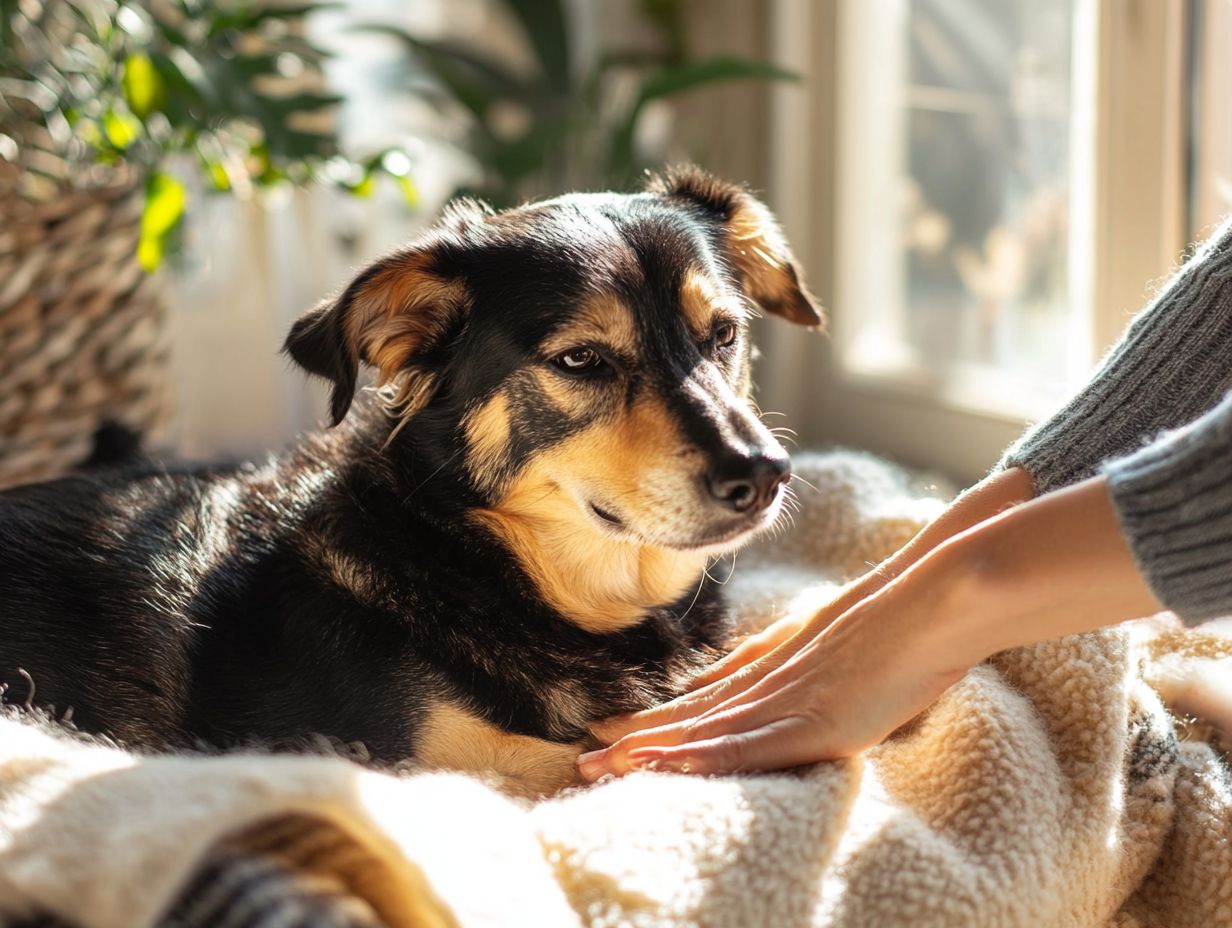
Natural remedies and techniques can be invaluable in managing your dog’s anxiety and enhancing their overall well-being.
Incorporating calming games, such as puzzle toys or scent work, engages your dog’s mind and diverts their attention from stressors. The importance of physical contact is paramount; simply petting or hugging your dog can release soothing hormones, alleviating their nervousness.
These gentle methods harmoniously complement traditional training and behavioral strategies, creating a holistic approach to anxiety management. By blending engaging activities with positive reinforcement and structured routines, you can cultivate a serene environment that addresses both the emotional and psychological needs of your canine companion, including the use of the best calming products for pets.
Start implementing these strategies today for a happier, calmer dog!
Creating a Calming Environment for Your Pet
Creating a soothing environment for your pet is essential for managing dog anxiety and fostering a sense of security and comfort. Establishing a safe, calm space within your home can serve as a refuge from stressors. Additionally, understanding what makes an effective pet anxiety counselor can provide further support. Adhering to a predictable schedule offers stability that can significantly reduce anxiety levels.
It’s important to familiarize yourself with dog body language to recognize when your dog is feeling overwhelmed. This enables you to intervene and support them effectively. By integrating these strategies, you not only enhance your dog’s well-being but also deepen the bond between you and your furry companion.
Tips for Reducing Stress and Anxiety
Implementing effective strategies to reduce stress and anxiety, such as natural remedies for pet anxiety, can greatly enhance your dog’s emotional well-being and overall quality of life.
To create a nurturing environment, consider incorporating calming games that promote interaction. Puzzle toys or gentle playtime activities can encourage mental stimulation and relaxation.
It’s also important to learn your dog’s body language. Understanding their signals can help you identify moments of discomfort or unease.
Physical contact, like gentle petting or cuddling, can act as a powerful source of comfort, reinforcing the special bond between you and your dog. Ultimately, fostering a peaceful atmosphere at home is crucial for alleviating their fears and anxieties. This allows your dog to truly thrive emotionally.
Frequently Asked Questions
Have questions about pet anxiety? Here are some helpful answers!
What Are Effective Strategies for Pet Anxiety?
Effective strategies for pet anxiety include behavioral training, natural remedies, medication, exercise, and best practices for pet anxiety training to create a safe and comfortable environment for your pet.
Can Behavioral Training Help with Pet Anxiety?
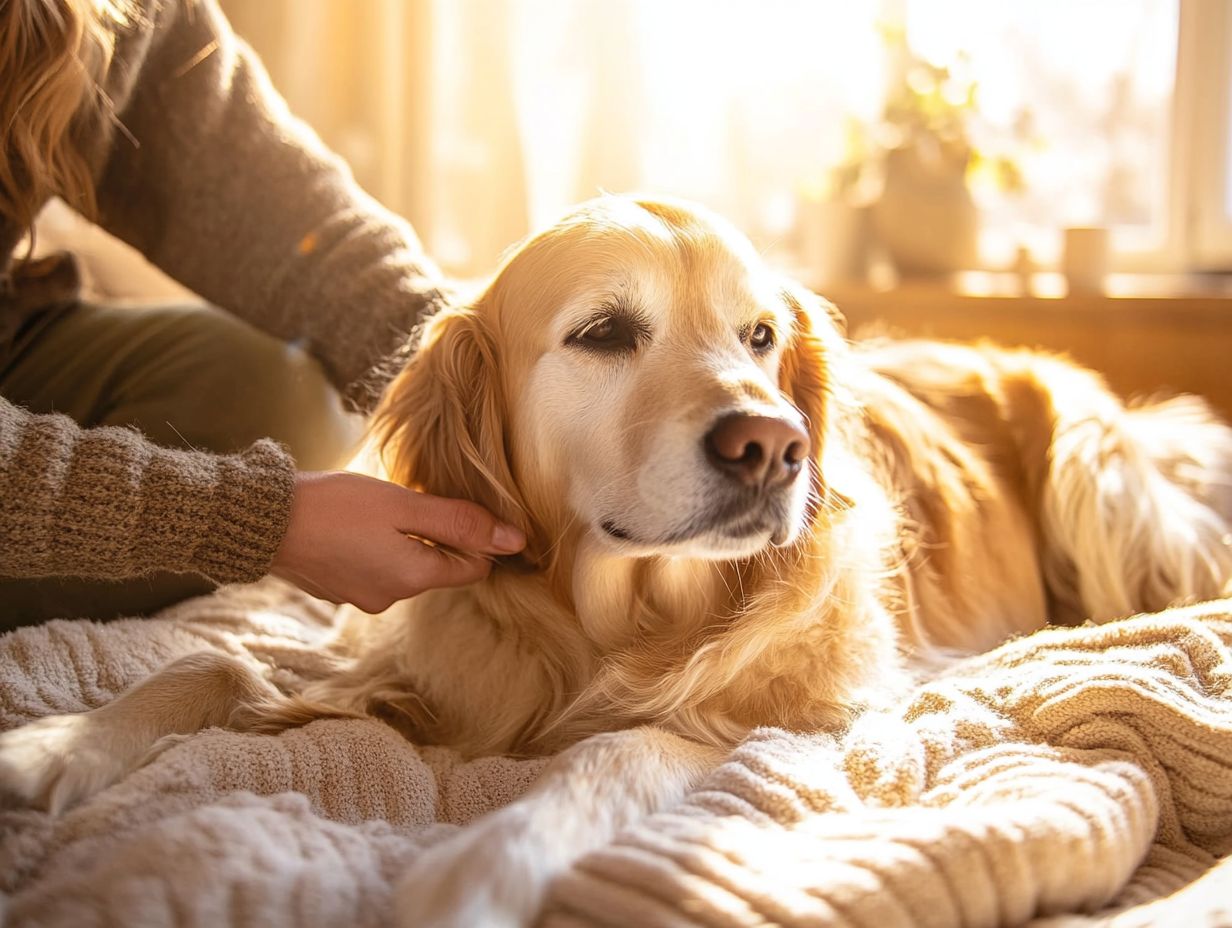
Yes, behavioral training can be an effective strategy for pet anxiety. This teaches your pet fun ways to handle their feelings and helps them manage their anxiety. For more insights, check out best practices for pet owners and anxiety.
Are There Any Natural Remedies for Pet Anxiety?
Yes, there are natural remedies such as calming supplements, essential oils, and products that mimic scents that help calm dogs. However, it is important to consult with your veterinarian before trying any natural remedies.
Is Medication a Recommended Strategy for Pet Anxiety?
Medication can be an effective strategy for pet anxiety, especially in severe cases. Alongside medication, consider helpful tips for reducing pet anxiety that your veterinarian can provide, including prescriptions for anti-anxiety medication or antidepressants to help your pet manage their anxiety.
How Can Exercise Help with Pet Anxiety?
Regular exercise can help reduce pet anxiety by releasing feel-good endorphins and providing a healthy outlet for your pet’s energy. It can also improve their overall well-being and strengthen the bond between you and your pet.
What Can I Do to Create a Safe and Comfortable Environment for My Pet?
Creating a safe and comfortable environment for your pet can include providing a quiet and peaceful space, using calming scents or music, and establishing a routine to help your pet feel secure. Additionally, you may want to explore resources for learning about pet anxiety and consider using a crate or a calming pet bed for your dog to retreat to when they feel anxious.

